Is the fringe radio station really in a financial crisis, or is it just running a hyped-up donation drive?
Fringe internet radio station Reality Check Radio was launched by the anti-vaccine mandates group Voices for Freedom in March 2023. For the next year, it undertook probably the most aggressive promotional campaign ever seen from a media startup in New Zealand. In ever corner of the country, its posters and billboards were inescapable – including this one from Wellington, which spent about two weeks frozen halfway between host Peter Williams and a strip club.
Then, on April 8, the station went “off air”. Listeners who tried to tune in on the app were greeted with the distorted sound of a dial-up modem, and told the station desperately needed their donations to keep it going. The announcement couldn’t have been timed better for maximum attention – that week, cuts at Newshub and TVNZ were dominating headlines.
Reality Check Radio’s decision to go off-air was covered by the NZ Herald, BusinessDesk, TVNZ and others. At the time, those sites would have believed they were covering the potential closure of media business. But as the weeks have passed it’s starting to look more and more like Reality Check Radio was running an orchestrated donations drive, and using mainstream news outlets to push their message.
When other radio stations shut down, there was outrage and defiance from on-air talent. In Today FM’s final minutes last year, Tova O’Brien turned to the mic and declared, “They’ve fucked us”. Fellow host Duncan Garner said “This is betrayal”.
Reality Check Radio was a little different. It announced its “closure” with a 14-minute, highly-produced short film by Alistair Harding (director of We Came Here for Freedom, a documentary about the parliament protests). The video starts with cuts of loyal RCR listeners going about their days, driving around or making a cup of tea. Then, their news cuts off. They look confused, lost, abandoned.
Cut to dramatic, sweeping shots of The Remarkables. Peter Williams is driving through the tussocked plains of Central Otago. He asks viewers to consider what New Zealand would be like without Reality Check Radio. “That’s not a New Zealand I want to contemplate,” he says, about a business that has existed for 13 months. Then, a montage of the vaccine mandate protests, and shots of RCR listeners talking about what they love most about the channel. “We all know something is wrong. But without Reality Check Radio, there will be no one to do anything about it. Then, all you’ll have is compliance and silence,” Williams warns his listeners. “We need to act now before the fires of tyranny turn into a blaze.”
The video ends with RCR hosts and super-fans pleading for donations. “Hopefully, it’s just a temporary closure,” Williams says. It never specifies why RCR is financially struggling. In fact, it boasts about listener and donor numbers. Rodney Hide claims they have 4,500 donors on their Foundation Members Club. “The truth is, we need a lot more support than that to keep going,” he says.
It’s not the sort of thing you typically see from a media outlet that is struggling to keep the lights on. It seemed more like a tightly coordinated effort to drum up donations. Sean Plunket, the founder of rival fringe radio station The Platform, certainly thought something was fishy. “I find it weird that an organisation would put so much effort into telling people they’d failed,” he told TVNZ’s Q+A. “I’m not sure if it isn’t some sort of misguided marketing ploy.”
RCR co-founder Alia Bland insisted the station really was in trouble. “The situation was dire,” she told reporter Whena Owen. But even then, she seemed to acknowledge the move to go off-air was a stunt. “Everything wants your attention right now, you have to find a way to get your point across to the people.”
Broadcasting on AM or FM airwaves is a major expense for radio stations, but that’s not a cost RCR has to bear. The station broadcasts entirely online, an extremely cheap distribution method. RCR’s most significant ongoing cost would be staff salaries. But going “off-air” didn’t seem to mean RCR staff stopped working. Hosts continued to post videos and interviews on the station’s social media channels. At first, it was mostly discussions between hosts about the state of the fundraiser. But before long, hosts pivoted to podcast-style versions of their shows. Alistair Harding interviewed lawyer Sue Grey about water flouridisation in Hastings. Paul Brennan and Cam Slater analysed the cabinet reshuffle. Maree Buscke hosted special coverage of the UK’s Cass Report on gender identity services, alongside Bob McCoskrie from Family First.
Roving reporter Tane Webster was in Titirangi vox-popping supermarket customers about facial recognition technology, in Devonport interviewing ACT MP Cameron Luxton, and in Remuera with NZ First MPs Shane Jones and Tanya Unkovich. Reality Check Radio was operating as usual, just without radio aspect (which, again, is not a major cost).
On April 17, RCR released “The Plan”, which included graphs showing how it wanted to pivot its business model from being mostly donor-funded to…. still being mostly donor-funded, but with way more donations. It set a goal of growing from 3,500 to 10,000 paying members. But “The Plan” is not just a path to sustainability, it promises rapid expansion, with new features like talkback functionality, documentaries and a press gallery presence.
In a short video update to her fans, Natalie Cutler-Welsh, host of the wellness show Up Your Brave, said she had received several messages from business owners offering to help RCR with its business plan. “We have no shortage of a plan, we just need dollars,” she said.
In a video on April 26, Buscke gave another update on the station’s return. “We’re not quite out of the woods, but we’re so close.. I can almost touch it.” Two days later, the station announced it needed $480,000 in donations before it would return to air, and some “gracious supporters” had offered to match every donation dollar-for-dollar. The RCR website homepage now shows a loading bar, slowly filling up as donations creep towards its $480,000 goal. Above the bar, a confident headline: The Return Is Near.
Reality Check Radio understands its audience intimately. Like most fringe media, it thrives on paranoia and fear. It repeatedly ingrains its listeners with the idea that powerful forces are trying to control them, and that government and mainstream media can’t be trusted. Its fundraising page says this explicitly: “Censorship will control what you can say…15 minute cities will control where you can live…. Mass migration will devalue your place in society.” Then, it asks: Are you prepared to face those challenges alone?
Two weeks after the announcement, an unbylined article ran on NZ Herald outlining how much money RCR was asking for, quoting heavily from a press release. You’d be hard pressed to find another instance of a media company promoting (inadvertently or not) another media outlet’s donation drive.
It now seems almost certain Reality Check Radio will be back on-air within weeks, if not days, with its coffers fattened by donations from fans who were genuinely afraid their favourite media outlet was at risk of collapse, and thanks to a helping hand from the mainstream outlets they so heavily criticise. Has Reality Check Radio really served its listeners, or just taken advantage of them?



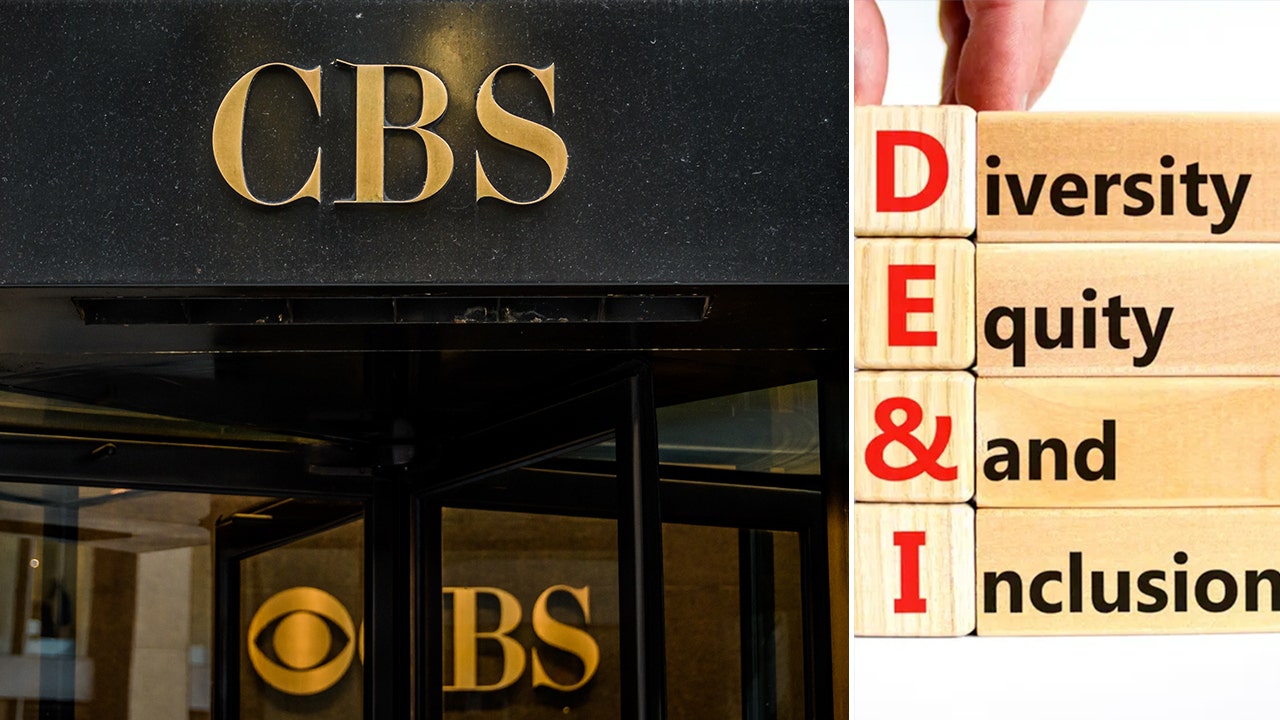




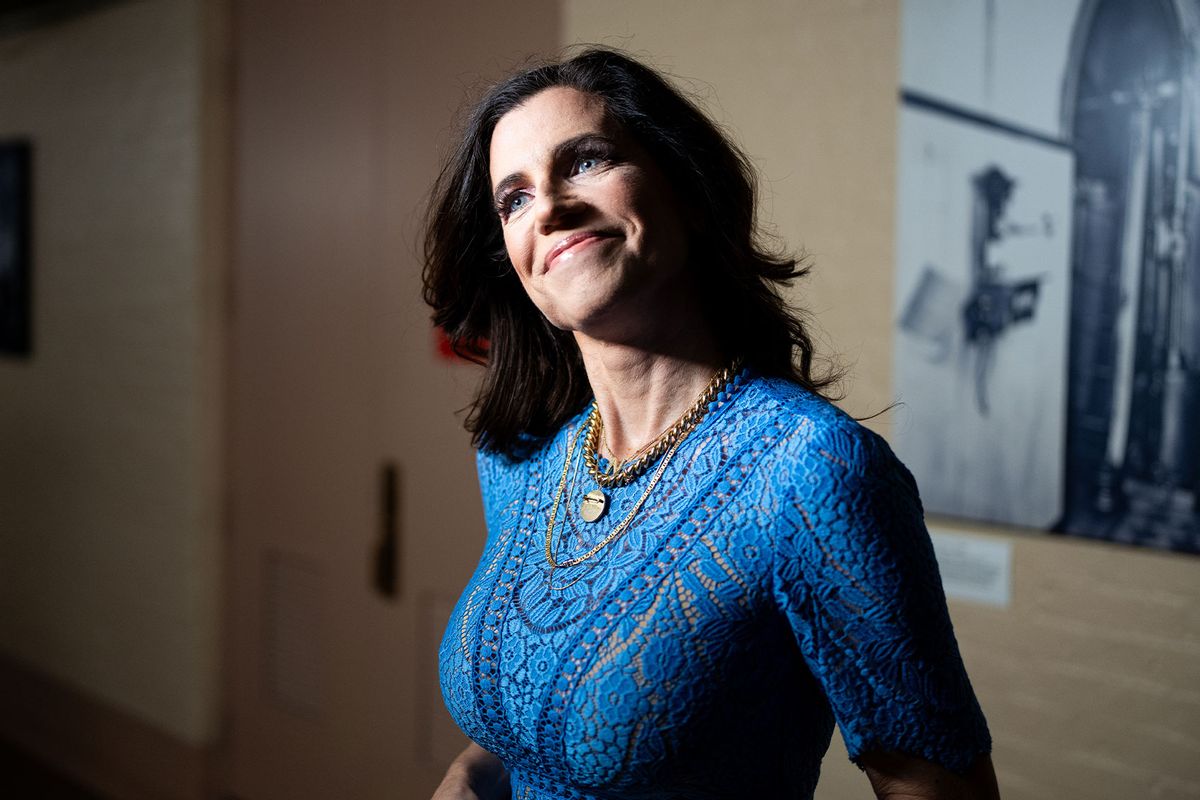

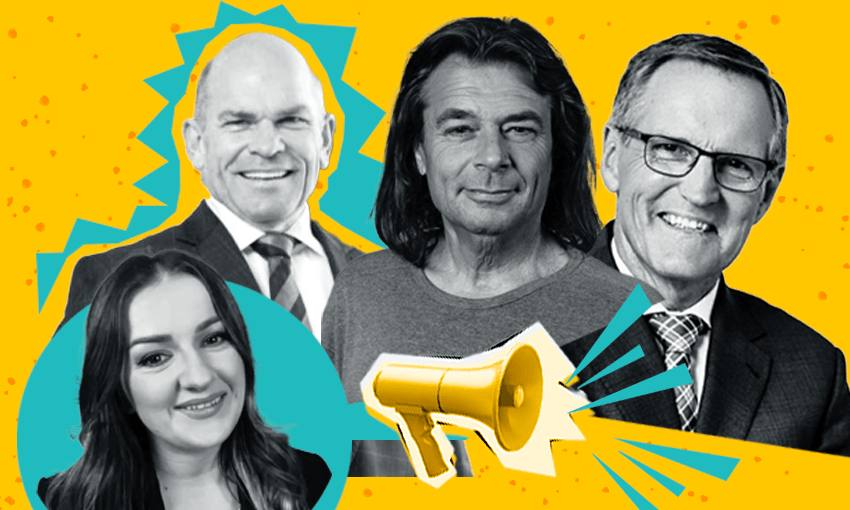

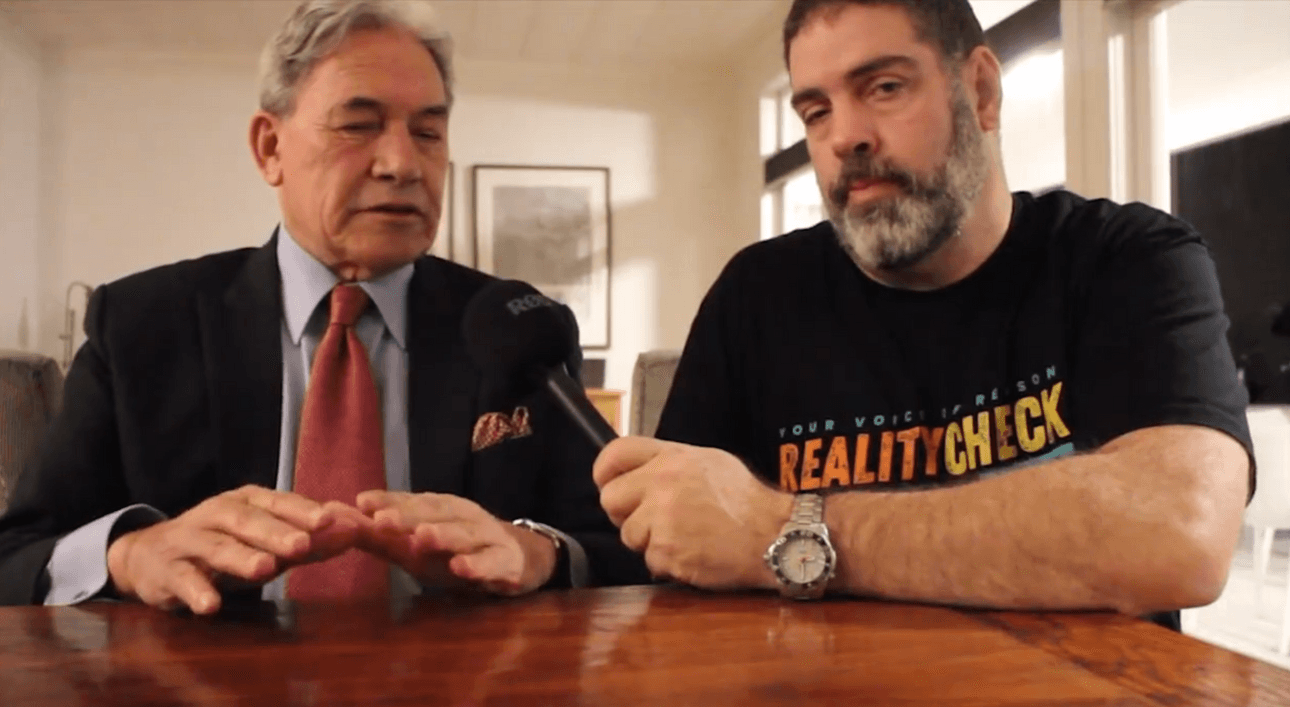
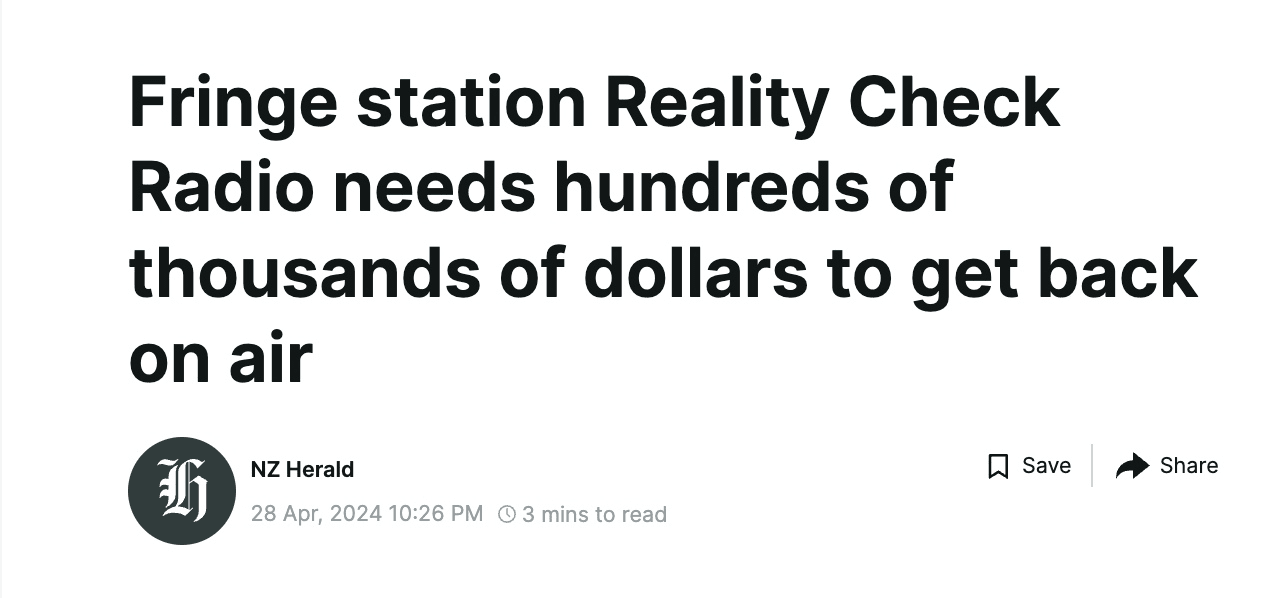


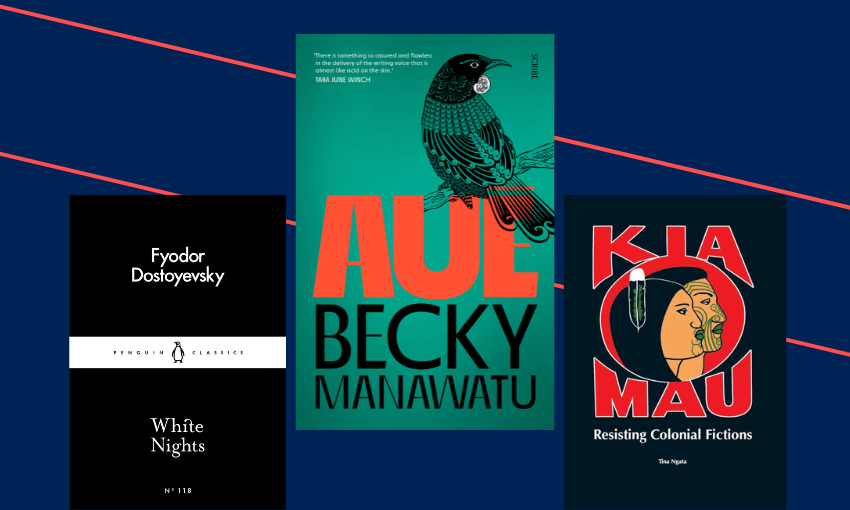





Discussion about this post